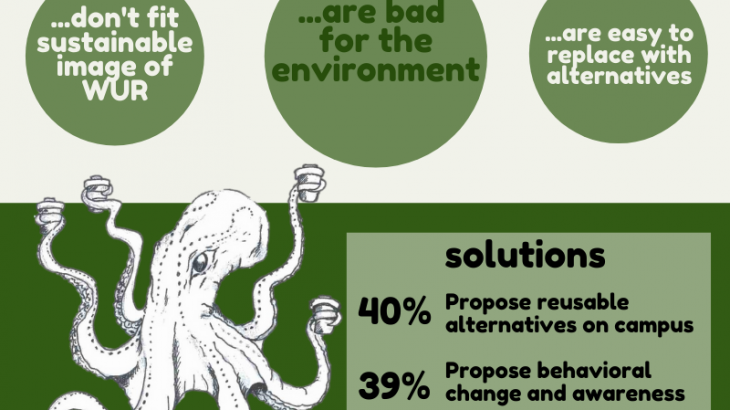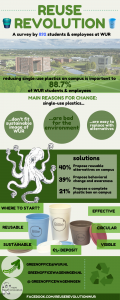Reuse Revolution – How to reduce single-use plastic on campus?
As a GreenOffice we are always open to receive feedback from students about the sustainability of the university and the campus. We try our best to incorporate this feedback in our projects to make the WUR even more sustainable! One of the comments we receive a lot is the question why there are still plastic coffee cups in the coffee machines at WUR.
After doing some research ourselves, we found out that WUR does still have plastic cups for two main reasons: the current machines in the education buildings (Forum, Orion, Leeuwenborch) work best with plastic cups, while inserting paper cups can create a higher error margin in the machine. Furthermore, a Life Cycle Analysis on different disposable cups (conducted by WUR) showed that plastic cups (when recycled) require less energy input and cause less emissions then alternatives such as paper cups.
However, this does not mean that there are no better alternatives to the disposable plastic (and paper) cups on the campus. Single-use (disposable) plastics are items that are only used once and are then thrown away. This causes unnecessary waste when there are also alternatives that create less waste and use less energy in the long term. That is why we wanted to have more input from students and employees about all disposable plastics.
Step 1: Create a survey to learn more about different opinions on single-use plastics
Last academic year the GreenOffice conducted a survey together with student council party S&I, to gain insights in the opinion and possibilities towards reducing single-use plastics on the Wageningen campus. After months of developing and promoting the survey, almost 900 people responded: 758 students and 134 employees.
Step 2: Share the results
When asked how important the reduction of single-use plastics on the WUR campus is, 88.7% of respondents answered that it was important or very important to them. The most important plastics to reduce were plastic coffee cups and plastic plates and cutlery.
The three main reasons mentioned in an open question about why single-use plastics should be tackled are:
- Because single-use plastics are not sustainable and bad for the environment.
- Because single-use plastics do not fit the ‘sustainable’ image of the WUR.
- Because single-use plastics are not necessary and are easy to replace.
The three main directions for solutions that are mentioned are:
- (40%): Focus on alternatives (reusable cups)
- (39%): Focus on awareness and behavioural change (higher price for plastic)
- (21%): Aim for a campus wide ban on disposable plastics (they are simply not necessary)
Some quotes for respondents:
“WUR profiles itself as sustainable, yet other universities (e.g. UU) have much more visible actions. Think about having vegetarian lunches by default, and only offering reusable water bottles in vending machines.”
“WUR should/must show its proactiveness: share its practises as a
role-model in sustainability.”
“WUR should be their own bench-marker: they are No.1 sustainable university, but can do much more”
Step 3: Formulate solutions
Based on these results, a working group including GreenOffice and S&I volunteers worked on figuring out the best way to move forward in finding the right solution and collaborating with the university. We decided to focus on reducing the plastic and paper coffee cups at first, because we want to take it step by step. In the end, the working group concluded that the best and most sustainable solution would be to get rid of disposable cups completely and have reusable cups throughout campus. This would require a system based on deposit, where you do not have to bring your own cup to university, but instead you would get a reusable cup (for 1 euro) automatically at the coffee bar. You can hand the cup in again after use (and get 1 euro back) or use it for the coffee machine / take it home as well. This way there is a circulation of reusable cups, and no need for disposables. An example of such a system is the Billie cup in Belgium or the Freiburg cup in Germany, where it has proven to be successful!
The WUR could be the first university in the Netherlands introducing such as system, and be a try front-runner in (visible) sustainability!
Future steps:
We were invited by a vision group of WUR working on the new catering policy, to present our results and our vision. We proposed to them the system of the Billie Cup and we will keep you updated on any progressions!
Vision: Take the lead in realising a disposable free WUR campus #nowastetowaste
Do you have any comments or ideas, or do you want to work together with us on our projects? Feel free to send an email to greenoffice@wur.nl or come by the office! (Forum C339)
By: Irene Marcic
Click on the image below to see our infographic!

